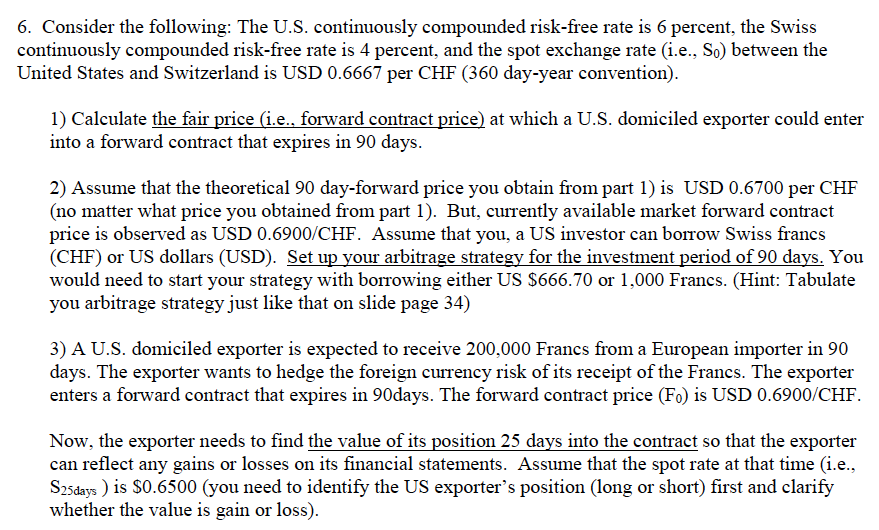
6. Consider the following: The U.S. continuously compounded risk-free rate is 6 percent, the Swiss continuously compounded risk-free rate is 4 percent, and the spot exchange rate (i.e., So) between the United States and Switzerland is USD 0.6667 per CHF (360 day-year convention) 1) Calculate the fair price (i.e.. forward contract price) at which a U.S. domiciled exporter could enter into a forward contract that expires in 90 days 2) Assume that the theoretical 90 day-forward price you obtain from part 1) is USD 0.6700 per CHF (no matter what price you obtained from part 1). But, currently available market forward contract price is observed as USD 0.6900/CHF. Assume that you, a US investor can borrow Swiss francs (CHF) or US dollars (USD). Set up your arbitrage strategy for the investment period of 90 days. You would need to start your strategy with borrowing either US S666.70 or 1,000 Francs. (Hint: Tabulate you arbitrage strategy just like that on slide page 34) 3) A U.S. domiciled exporter is expected to receive 200,000 Francs from a European importer in 90 days. The exporter wants to hedge the foreign currency risk of its receipt of the Francs. The exporter enters a forward contract that expires in 90days. The forward contract price (Fo) is USD 0.6900/CHF. Now, the exporter needs to find the value of its position 25 days into the contract so that the exportei can reflect any gains or losses on its financial statements. Assume that the spot rate at that time (i.e., S25days ) is S0.6500 (you need to identify the US exporter's position (long or short) first and clarify whether the value is gain or loss) 6. Consider the following: The U.S. continuously compounded risk-free rate is 6 percent, the Swiss continuously compounded risk-free rate is 4 percent, and the spot exchange rate (i.e., So) between the United States and Switzerland is USD 0.6667 per CHF (360 day-year convention) 1) Calculate the fair price (i.e.. forward contract price) at which a U.S. domiciled exporter could enter into a forward contract that expires in 90 days 2) Assume that the theoretical 90 day-forward price you obtain from part 1) is USD 0.6700 per CHF (no matter what price you obtained from part 1). But, currently available market forward contract price is observed as USD 0.6900/CHF. Assume that you, a US investor can borrow Swiss francs (CHF) or US dollars (USD). Set up your arbitrage strategy for the investment period of 90 days. You would need to start your strategy with borrowing either US S666.70 or 1,000 Francs. (Hint: Tabulate you arbitrage strategy just like that on slide page 34) 3) A U.S. domiciled exporter is expected to receive 200,000 Francs from a European importer in 90 days. The exporter wants to hedge the foreign currency risk of its receipt of the Francs. The exporter enters a forward contract that expires in 90days. The forward contract price (Fo) is USD 0.6900/CHF. Now, the exporter needs to find the value of its position 25 days into the contract so that the exportei can reflect any gains or losses on its financial statements. Assume that the spot rate at that time (i.e., S25days ) is S0.6500 (you need to identify the US exporter's position (long or short) first and clarify whether the value is gain or loss)







